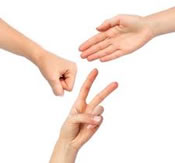
Last weekend a couple of couchsurfers from the USA stayed with me. When they’re not surfing from sofa to sofa they live in Leipzig in Germany and one of them speaks German fluently. When she discovered that I also speak German, we started chatting in German. Even after many years of neglect my German is still there, although I often flail around for words and my grammatical knowledge is rusty. I learnt some interesting expressions, including:
- Schnick, Schnack, Schnuck = Rock-paper-scissors (game)
- (der) Streber = geek, nerd
- streberhaft = geekiness, nerdiness
- (die) Kneipe = pub
- innerer Schweinehund = one’s weaker self; inner temptation; procrastination
According to Wikipedia the game rock, paper, scissors is also known as Schere, Stein, Papier; Ching, Chang, Chong; Klick, Klack, Kluck; Stein schleift Schere; Schnibbeln, Knobeln oder Schniekern in German. Apparently alternative names for this game in English include roshambo, Paper-Scissors-Stone and ick-ack-ock – have you heard of these?
The game originally comes from China and was first mentioned in a book by 谢肇淛 (Xie Zhaozhi) during the Ming Dynasty (c. 1600), who said that game dates back to the Han Dynasty (206 BC – 220 AD) and calls it 手势令 (shoushiling) or “hand command”.
What do you call this game?
In Finnish, it is called kivi-sakset-paperi or kivi-paperi-sakset (rock-paper-scissors), often abbreviated KPS.
I don’t remember that we called it this but we used to count off /lɑːm zɑːm poʊ/. This was in the north side of Chicago in the ’50s. Many of the kids in my neighborhood were of Italian extraction and they claimed it was Italian for “One, two, three”. I have since found this not to be true but still, that’s what we did. It seems to be related to ‘roshambo’.
I’ve never heard it called anything but Rock-Paper-Scissors in English.
How about chants that go with the game? When I was a kid we always just counted “one, two, three” before revealing our choice.
In Japanese it’s jan-ken-pon or janken. The standard chant is “jan, ken, pon“, but if both players reveal the same choice, then next one goes “ai-, ko, des’yō ” (“It’s a tie!”).
Petréa, I remember playing jan-ken-pon with the children in Japan well! Do you know what the chant at the beginning, ‘saisho ha guu…’, means?
In Swedish it’s ”sten, sax, påse” (stone-scissors-bag).
In Japan it is called:
JanKen or JanKenPon
じゃんけん
We used it there to settle lots of issues.
Loved the German name.
Ooooops, just read Petréa’s post. Sorry
Sathyarthi: “saisho wa guu” (particle wa is written with the syllable ha) means “first is the rock”. The players start by showing their fist, but when the chant gets to “pon”, they show their intended move.
In Arabic it’s same as in English: H’ajara waraqa maqas’ (or miqas’) [حجرة ورقة مقص], stone paper scissors, respectively.
Rauli beat me to it! I only learned that part very recently, as the main character of one of my current favorite TV shows has adopted it as a sort of war cry. (One of his martial-arts moves involves focusing energy into his fist so that it’s much like a rock.)
In Hebrew it’s also “rock, paper, scissors”, however, in Netanya (a city in Israel), it’s called “sha”. That is also what they say before playing (much faster than “rock, paper, scissors”). Netanyans are unaware that the word is specific to their city.
Instead of “one, two, three,” I’ve always heard “rock, paper, scissors, shoot!” On rock, paper, and scissors the children beat a fist onto their palm, and on shoot they reveal their move.
Rauli, Petréa – yappari sou da-ne! Thanks for enlightening me…
I only know it as rock paper scissors… But last summer my siblings and I were playing it with our cousins to decide something. When we grew up, we always say, “Rock, paper, scissors, shoot!” and then reveal after “shoot.”. Turns out pur cousins don’t do that last part…
Thanks for this post – now I have some alternative names for this game when my students play it! I guess I had just assumed it would be Stein Papier Schere, so finding this post was helpful 🙂
I’m familiar with Rock Paper Scissors and Roshambo. When I was young, my cousins and I would say, “Yang, yang, pess!” when we played. To be honest, I haven’t the slightest idea why.
In Korea, the game is called 가위바위보 (ka-wi, ba-wi, bo), which translates to scissors, rock, paper. Students use 가위바위보 to settle almost any dispute, often using an interesting variant where large groups throw at the same time and go for it elimination-style. For example, if there are nine students playing, you might get 3 of each sign several times, but as soon as only 2 are thrown (e.g. 4 rocks and 5 scissors), the losers are eliminated and this continues until there is only one left.